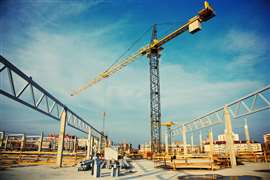


The CE100, a financial analysis league table of European contractors, has been released by Construction Europe, revealing who the top 10 European construction companies are.
Published every year, the report highlights the scale of the European construction sector in 2023.
The European construction industry faced a turbulent year in 2023, marked by inflation, supply chain disruptions, and labour shortages. Yet, the continent’s top 10 construction firms demonstrated resilience, adapting to the evolving market conditions and capitalising on opportunities in infrastructure and sustainable energy projects.
Before revealing the top 10 construction companies in Europe, it is important to explain how the list is compiled.
Based on sales revenues from 2023, the CE100 is put together from a range of sources including audited annual accounts, companies’ statements of revenues and information from third parties.
So, when taking into account revenues, here are the top 10 European construction companies.
UK-based Balfour Beatty remains a key player in the European construction scene, posting €9 billion in sales. Known for its strong presence in infrastructure, Balfour Beatty is a major participant in the UK’s largest ongoing projects, including the HS2 rail development in collaboration with Vinci. The company’s focus on innovation, sustainability, and large public works has allowed it to stay competitive, despite the fragmented and competitive nature of the UK construction market. Balfour Beatty’s commitment to digitalisation and green construction continues to strengthen its position as a leading UK contractor.
Italy-based Webuild, formerly known as Salini Impregilo, ranked tenth with substantial contributions to major infrastructure projects globally. The company’s focus on high-speed railways, dams, and bridges allowed it to maintain strong performance. Its involvement in green infrastructure, particularly hydropower and renewable energy projects, helped solidify its place among Europe’s construction leaders.
In ninth place is Saipem, an Italian firm renowned for its engineering and construction expertise in the energy sector. Saipem posted strong sales, driven by its role in major offshore oil and gas projects as well as renewable energy initiatives. The company’s involvement in the energy transition, focusing on cleaner energy solutions, contributed significantly to its 2023 performance.
Swedish construction giant Skanska, ranked eighth, continues to be a leader in sustainable construction. Known for its green building projects, Skanska played a pivotal role in the shift toward low-carbon infrastructure. The company also benefited from its focus on infrastructure projects in the Nordic region and the United States, where demand remained strong.
In a previous issue, Construction Europe interviewed Swati Paul, executive vice president at Skanska UK, about the company’s efforts in promoting sustainability and inclusivity.

Spanish firm Acciona, taking seventh place, continued to thrive thanks to its strong presence in the renewable energy and infrastructure sectors. Acciona’s projects in solar and wind energy, coupled with its commitment to sustainability, helped it weather economic headwinds in 2023. The company also secured contracts for significant infrastructure developments across Europe and Latin America.
In sixth place, Austria’s Strabag posted impressive results through a combination of digital innovation and operational efficiency. Strabag’s focus on modular construction and digital tools like robotics and Building Information Modelling (BIM) helped improve project delivery times and cost management, allowing the company to maintain its competitive edge despite labor shortages and rising material costs.
French firm Eiffage ranked fifth, with a strong focus on public works and infrastructure projects across Europe. In 2023, Eiffage’s investments in renewable energy, particularly solar and wind farms, bolstered its position. The company’s ability to secure public-sector contracts in its home market of France further contributed to its solid performance.
Spain’s ACS, ranked third, continued to be a major player in the global construction market, particularly through its Turner Construction subsidiary in the United States. Despite inflationary pressures, ACS capitalized on its strong presence in the North American market, where demand for infrastructure and renewable energy projects remained high. The firm’s ability to navigate rising costs while maintaining profitability was key to its success.
Germany’s Hochtief, a subsidiary of Spain’s ACS, ranked alongside its parent company in third due to its involvement in large infrastructure projects in the Americas and Australia. Hochtief’s use of digital construction methods, including 3D printing and prefabrication, helped it overcome operational challenges and improve project outcomes. The firm’s role in key infrastructure projects, such as airports and highways, ensured steady demand for its services.
In second place, French firm Bouygues Construction demonstrated resilience through strategic acquisitions and digital transformation efforts. Bouygues’ focus on smart buildings and green construction methods resonated with clients in both the public and private sectors. Its diversified portfolio, which spans everything from transportation infrastructure to renewable energy projects, helped mitigate the effects of rising material costs.
At the top of the list is Vinci, another French construction giant, with €68.5 billion in sales. Vinci’s dominance is attributed to its diversified portfolio, which includes construction, concessions, and energy services. Its involvement in public-private partnerships (PPPs) and sustainable initiatives, such as carbon-neutral building solutions, allowed it to remain competitive in 2023.
Vinci’s key projects, including the UK’s HS2 rail line, further underscored its ability to take on large-scale infrastructure challenges despite global economic volatility. The company recently appointed a new chairman.